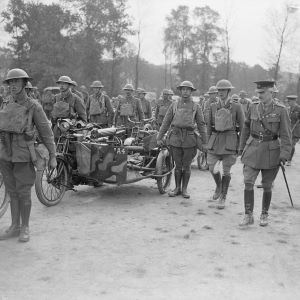 July 2024 Meeting Summary
July 2024 Meeting Summary
Our July talk, given by the popular speaker Mike Cooper, was entitled “Finding Great Grandad: A practical introduction to tracing WW1 soldiers“
Mike’s approach to the subject differed from that of our previous speakers on World War One by emphasising the importance of defining one’s objectives, careful preparation, knowing the subject person, and consulting family members and friends.
Perseverance can be greatly rewarding for those discovering family members who possess memorabilia, whether documents, letters, medals, or photographs. Mike explained how the latter, in particular, can reveal much more than a first glance might suggest.
It was important to recognise that your relative may not necessarily have been posted to the Western Front, as the army was deployed in many theatres, including Italy, Africa, Salonika, the Middle East, and even within the UK.
The fortunate researcher may already know in which unit or role their ancestor served, or whether they were in the regular army, the Territorials, a volunteer, or a conscript (after 1916).
Initial sources, many of which are available online, would include the Commonwealth War Graves Commission, the National Archives, and the Imperial War Museum archive, before expanding into army records.
Mike’s numerous slides demonstrated that gaining some understanding of the structure of the British Army at that time would be invaluable, enabling the researcher to better interpret the data discovered and much of the jargon used in army records.
He concluded the talk by showcasing online sources and recommending the following books:
- Simon Fowler Tracing your First World War Ancestors 2nd Edn. (Pen & Sword. 2021)
- Andrew Rawson The British Army 1914-18(History Press, 2014)
- Mike Chappell The British Army in World War I. [3 vols] Osprey, 2003, 2005)
